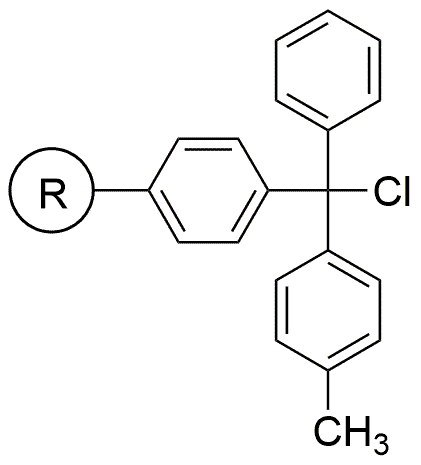4-Methyltrityl chloride resin is widely utilized in research focused on:
- Solid-Phase Peptide Synthesis: This resin serves as a key support for synthesizing peptides, allowing for efficient coupling reactions and easy cleavage of the final product.
- Drug Discovery: It is employed in the development of pharmaceutical compounds, enabling researchers to create diverse libraries of small molecules for screening against biological targets.
- Bioconjugation: The resin is used to attach biomolecules, such as proteins or nucleic acids, to solid supports, facilitating the study of interactions and functions in a controlled environment.
- Analytical Chemistry: It aids in the purification and isolation of compounds, enhancing the accuracy of analytical methods like HPLC and mass spectrometry.
- Material Science: The resin can be utilized in the development of novel materials, contributing to advancements in fields such as nanotechnology and polymer science.
General Information
Properties
Safety and Regulations
Applications
4-Methyltrityl chloride resin is widely utilized in research focused on:
- Solid-Phase Peptide Synthesis: This resin serves as a key support for synthesizing peptides, allowing for efficient coupling reactions and easy cleavage of the final product.
- Drug Discovery: It is employed in the development of pharmaceutical compounds, enabling researchers to create diverse libraries of small molecules for screening against biological targets.
- Bioconjugation: The resin is used to attach biomolecules, such as proteins or nucleic acids, to solid supports, facilitating the study of interactions and functions in a controlled environment.
- Analytical Chemistry: It aids in the purification and isolation of compounds, enhancing the accuracy of analytical methods like HPLC and mass spectrometry.
- Material Science: The resin can be utilized in the development of novel materials, contributing to advancements in fields such as nanotechnology and polymer science.
Documents
Safety Data Sheets (SDS)
The SDS provides comprehensive safety information on handling, storage, and disposal of the product.
Product Specification (PS)
The PS provides a comprehensive breakdown of the product’s properties, including chemical composition, physical state, purity, and storage requirements. It also details acceptable quality ranges and the product's intended applications.
Certificates of Analysis (COA)
Search for Certificates of Analysis (COA) by entering the products Lot Number. Lot and Batch Numbers can be found on a product’s label following the words ‘Lot’ or ‘Batch’.
*Catalog Number
*Lot Number
Certificates Of Origin (COO)
This COO confirms the country where the product was manufactured, and also details the materials and components used in it and whether it is derived from natural, synthetic, or other specific sources. This certificate may be required for customs, trade, and regulatory compliance.
*Catalog Number
*Lot Number
Safety Data Sheets (SDS)
The SDS provides comprehensive safety information on handling, storage, and disposal of the product.
DownloadProduct Specification (PS)
The PS provides a comprehensive breakdown of the product’s properties, including chemical composition, physical state, purity, and storage requirements. It also details acceptable quality ranges and the product's intended applications.
DownloadCertificates of Analysis (COA)
Search for Certificates of Analysis (COA) by entering the products Lot Number. Lot and Batch Numbers can be found on a product’s label following the words ‘Lot’ or ‘Batch’.
*Catalog Number
*Lot Number
Certificates Of Origin (COO)
This COO confirms the country where the product was manufactured, and also details the materials and components used in it and whether it is derived from natural, synthetic, or other specific sources. This certificate may be required for customs, trade, and regulatory compliance.


